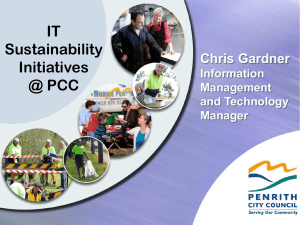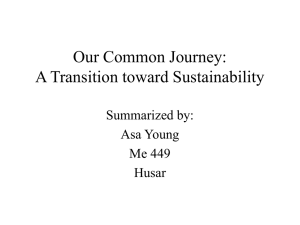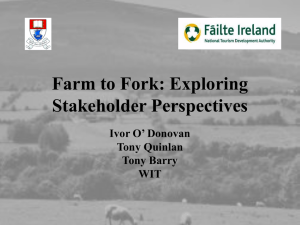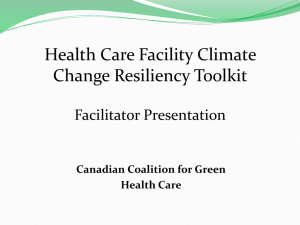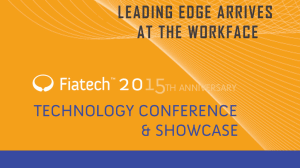Holistic Approach Needed for Disaster Resiliency, Sustainability
advertisement
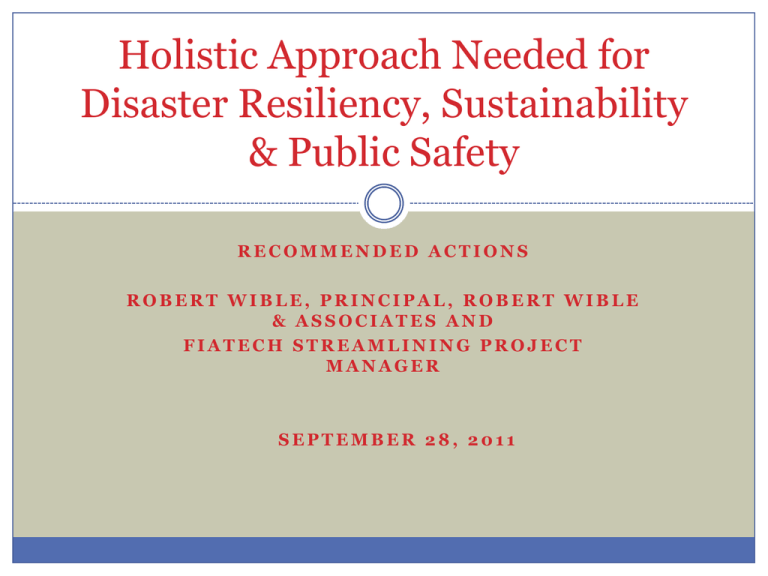
Holistic Approach Needed for Disaster Resiliency, Sustainability & Public Safety RECOMMENDED ACTIONS ROBERT WIBLE, PRINCIPAL, ROBERT WIBLE & ASSOCIATES AND FIATECH STREAMLINING PROJECT MANAGER SEPTEMBER 28, 2011 HOLISTIC APPROACH NEEDED ROBERT WIBLE & ASSOCIATES & ALLIANCE FIATECH – Consortium at UT Improve Efficiency ENR MARCH 2-3 CONFERENCE ON RESILIENCY Holistic Approach Needed – Presentation When do we have enough wakeup calls ? Problems We Face Disaster Resiliency = Sustainability & Sustainability = Disaster Resiliency - Examples of Projects that Benefit Both That Should Be Replicated Recommendations from March 2-3, 2011 Mitigating Disaster Through Design & Construction Conference – Washington, DC – McGraw – Hill Actions we must take together- public & private sectors – EM, Development, Sustainability, Safety Communities Q & A and Discussion Holistic Approach Needed - How Many More Wake-up Calls Do We Need? 2011 Alone Christchurch, NZ & Japan’s Triple Disaster – Quake, Tsunami, Nuclear resulting in thousands of dead /10 years to recover while jobs move to other nation In U.S. # of Man-made & Natural Disasters Increasing: - Record Tornadoes in South & Midwest - Record floods in Mid-Atlantic / New England All placing incredible demands on our people, our economy, & aging infrastructure Are we ready for The Black Swan event? Holistic Approach Needed To Address On-Going Problem Yet We Continue At National & Local Levels To: treat sustainability & resiliency as separate unrelated issues forcing these areas to compete for scarcer resources & public attention. prepare for, respond to & recover from future catastrophic events in piecemeal fashion, with most of public still believing “it can’t happen here.” (Less than 50% of nation covered by codes that address hazards!) Despite Administration declaring “resilience” a national priority, Federal Agencies continue siloed approach ignoring links with Sustainability, Economic Recovery & Pubic Safety and a concerted, well coordinated effort with private sector & state & local governments Congress attention focused on budget fights & 2012 THE NEED FOR A HOLISTIC APPROACH Sustainability = Disaster Resiliency Resiliency = Sustainability Examples of Holistic Approaches: Regulatory Streamlining Effective & Efficient Building Codes Administration & Enforcement - Time Savings from use of IT Regulatory Streamlining – Benefits Sustainability, Economic Development, Safety ICC Guideline for Replicable Buildings - single plan review for residential & commercial structures reducing time spent in plan review in California from 24 to 8 ½ weeks in California (FIATECH & ICC) Same level of safety! Buildings on tax rolls & hiring 2 months sooner ! Buildings up after a Disaster 2-3 months sooner! Examples Resiliency & Sustainability State of California – 2008 project showed ability to make mobile field inspection devices interoperable to immediately share damage assessment data with State EOC & Build Statewide/Regional networks Use of mobile inspection tech saves 30% time! IVR and MOBILE INTERNET or VPN JURI DATA STAGED and INSPECTION DATA FEMA FORMS PAPER-BASED FORMS DEVICES with PROPAGATED DATA Examples Resiliency & Sustainability Aiding Louisiana in adopting a uniform statewide building code with disaster mitigation provisions & developing Roadmap for Application of IT to strengthen / streamline codes enforcement & speed construction Electronic Plan Review & Automated Code Checking Tools – Reduce costs & time by 80% - Green Benefits & enable cities to build secure databases of electronic as-builts to provide to first responders – Portland, ME RECOMMENDATIONS FROM THESE EFFORTS Bring together public & private sector leaders from EM, Economic Development & Sustainability Community to research & establish list of policy actions & best practices that promote sustainability & disaster resiliency - Share across nation & use financial, insurance & tax incentives & legislation to put in place! Expand # of jurisdictions streamlined processes & using IT – updated codes, ePlan Review, interoperable mobile inspections & regional damage assessment networks RECOMMENDATIONS FROM NATIONAL CONFERENCE Recommendations from March 2-3 ENR Conference - 4 of 33 RECOMMENDATIONS – Private Sector Banking, accounting & insurance – provide financial incentives for retrofitting homes & businesses for both sustainability & disaster resiliency Establish a venue for national coordination of changes in codes to better coordinate them to reduce adverse impact on sustainability and disaster resiliency – Lack of predictability keeping owners & developers from putting needed improvements in place. FORCES DRIVING BUILDING OWNERS & FORCES DRIVING OWNERS & DEVELOPERS – IMPACTING COSTS, ECONOMIC RECOVERY & DISASTER RESILIENCY Financin Occupa g ncy Building & Fire Safety Codes Codes* O&M Costs Energy Environme Resiliency ntal Efficienc * Sustainabi y y* lity lity* *Things that can be changed through better coordination/holistic approach to regulations, codes & standards RECOMMENDATIONS TO CONGRESS & ADMINISTRATION Congress fund a national Infrastructure Renewal Readiness effort to ensure our codes/standards /permitting systems are able to guide Nation in most consistent & efficient way possible over lifetime of these national assets. RECOMMENDATIONS TO CONGRESS & ADMINISTRATION Study possibility of funding mitigation thru savings incurred from reduced cost of disaster relief Review, identify and reduce regulatory barriers to rapid disaster response and recovery What will be identified also will aid in more efficient system during non-disaster times! ACTIONS WE CAN TAKE Work Together To: 1. Gain Congressional hearings on the Report & its Recommendations to Public & Private Sector 2. Establish national venue for identifying & recommending actions that link sustainability & resiliency 3. Work together to better inform elected officials, public & business community about effectiveness & cost efficiency of investments in mitigation & sustainability 4. End piecemeal & patchwork approaches to resiliency QUESTIONS & DISCUSSION Comments on linking Sustainability & Resiliency Comments on recommendations & proposed actions What other actions should be taken? Timeframes & Stakeholders – who all must be involved? How do we get involved? “It will be the companies, communities, & countries that are most resilient who will have the competitive advantage over those that are not!” Stephen Flynn President Center for National Policy 3/3/11 THANK YOU - CONTACT Robert Wible & Associates rcwible@comast.net & www.natlpartnerstreamline.org FIATECH at www.FIATECH.org







